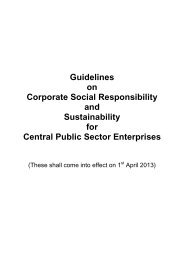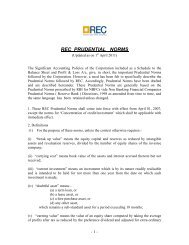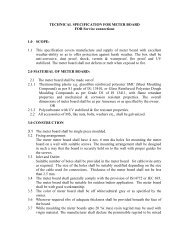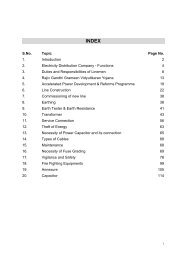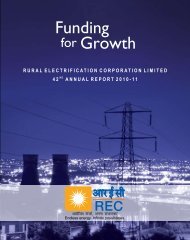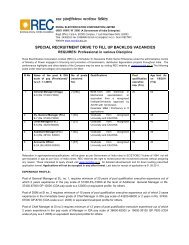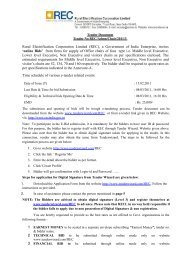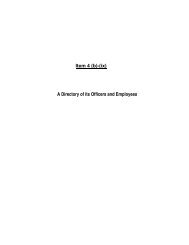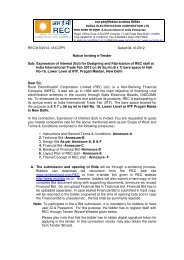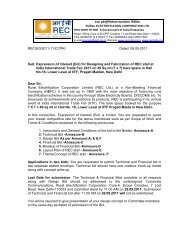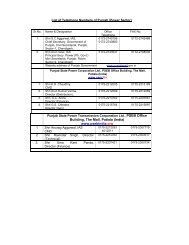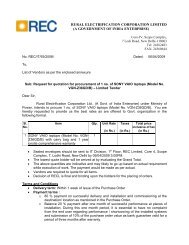REC- 1-51.p65 - Rural Electrification Corporation Ltd.
REC- 1-51.p65 - Rural Electrification Corporation Ltd.
REC- 1-51.p65 - Rural Electrification Corporation Ltd.
Create successful ePaper yourself
Turn your PDF publications into a flip-book with our unique Google optimized e-Paper software.
SIGNIFICANT ACCOUNTING POLICIES FOR THE YEAR ENDED 31.03.2010<br />
1. BASIS OF PREPARATION OF FINANCIAL STATEMENTS<br />
(a) Accounting Convention: - The financial statements are<br />
prepared under the historical cost convention on accrual<br />
basis and in accordance with generally accepted accounting<br />
principles and applicable accounting standard in India. The<br />
financial statements adhere to the relevant presentational<br />
requirement of the Companies Act, 1956.<br />
(b) Use of Estimates: - The preparation of financial statements<br />
in conformity with generally accepted accounting principles<br />
requires management to make estimates and assumption that<br />
affect the reported amounts of assets and liabilities and<br />
disclosure thereof at the date of the financial statements and<br />
the reported amounts of revenue and expenses during the<br />
reporting period. Actual results could differ from these<br />
estimates. Difference between the actual results and<br />
estimates are recognized in the period in which results<br />
materialize.<br />
2. REVENUE <strong>REC</strong>OGNITION<br />
The <strong>Corporation</strong> has formulated its own detailed Prudential<br />
Norms which are broadly based on the Prudential Norms<br />
prescribed by RBI for NBFCs. Accounting is done in<br />
accordance with these Prudential Norms of <strong>REC</strong> and the<br />
salient features of the same for Income Recognition, Asset<br />
classification and Provisioning are as under:<br />
2.1. Income Recognition<br />
a. Income on Non Performing Assets where interest/ principal<br />
has become overdue for two quarters or more is recognized<br />
as and when received and appropriated. Any such income<br />
recognized before the asset becomes non-performing and<br />
remaining unrealized is reversed.<br />
Unless otherwise agreed, the recoveries from the borrowers<br />
are appropriated in the order of (i) costs and expenses of<br />
<strong>REC</strong> (ii) penal interest including interest tax, if any (iii)<br />
overdue interest including interest tax, if any, and (iv)<br />
repayment of principal, the oldest being adjusted first.<br />
In respect of loans whose terms are renegotiated /<br />
rescheduled / restructured, income is recognized on accrual<br />
basis when it is reasonably expected that there is no<br />
uncertainty of receipt of dues from the borrowers and a<br />
legally binding Memorandum of Agreement has been<br />
executed and there has been satisfactory performance under<br />
the renegotiated or rescheduled or restructured terms till a<br />
period of at least one year from the effective date of the<br />
corresponding MOU.<br />
b. Income of Agency Charges on RGGVY Schemes is recognized<br />
on the basis of the services rendered and amount sanctioned<br />
by the Ministry of Power.<br />
c. Income from investments<br />
(1) Income from dividend on shares of corporate bodies and<br />
units of mutual funds shall be taken into account on cash<br />
basis:<br />
Provided that the income from dividend on shares of<br />
corporate bodies may be taken into account on accrual basis<br />
when such dividend has been declared by the corporate body<br />
in its annual general meeting and <strong>REC</strong>’s right to receive<br />
payment is established.<br />
(2) Income from bonds and debentures of corporate bodies and<br />
from Government securities/bonds shall be taken into<br />
account on accrual basis:<br />
Provided that the interest rate on these instruments is predetermined<br />
and interest is serviced regularly and is not in<br />
arrears.<br />
(3) Income on securities of corporate bodies or public sector<br />
undertakings, the payment of interest and repayment of<br />
principal of which have been guaranteed by Central<br />
Government or a State Government shall be taken into<br />
account on accrual basis.<br />
2.2 Assets Classification<br />
Loans and advances and any other form of credit are<br />
classified into the following classes, namely:<br />
(i) Standard Assets: ‘Standard assets’ means an asset which is<br />
not an NPA and in respect of which no default in repayment<br />
of principal or payment of interest is perceived and which<br />
does not disclose any problem or carry more than normal<br />
risk attached to the business, or a deemed standard asset<br />
which is defined below;<br />
and<br />
‘a deemed standard asset’ means<br />
A facility made to a state utility against state government<br />
undertaking for deduction from central plan allocation for<br />
making payment to <strong>REC</strong> against its unpaid dues.<br />
(ii) Sub-Standard Assets: ‘Sub-standard asset’ means:<br />
(a) an asset which has been classified as non-performing asset<br />
for a period not exceeding 18 months;<br />
(b) an asset where the terms of the agreement regarding interest<br />
and / or principal have been renegotiated or rescheduled or<br />
restructured, until the expiry of one year of satisfactory<br />
performance under the renegotiated or rescheduled or<br />
restructured terms.<br />
(c) The rescheduling or restructuring or renegotiation of a<br />
standard infrastructure loan asset shall not cause it to be<br />
reclassified if the revised project is found to be viable by the<br />
competent authority.<br />
(iii) Doubtful Assets: Doubtful asset means an asset which<br />
remains a substandard asset for a period exceeding 18<br />
months.<br />
(iv) Loss Assets: Loss assets means –<br />
a) An asset which has been identified as loss asset by <strong>REC</strong> to<br />
the extent it is not written off by <strong>REC</strong> or the asset remains<br />
doubtful for a period exceeding 5 years, whichever is earlier.<br />
b) An asset which is adversely affected by a potential threat of<br />
non-recoverability due to either erosion in the value of<br />
security or non availability of security or due to any<br />
fraudulent act or omission on the part of the borrower.<br />
73



